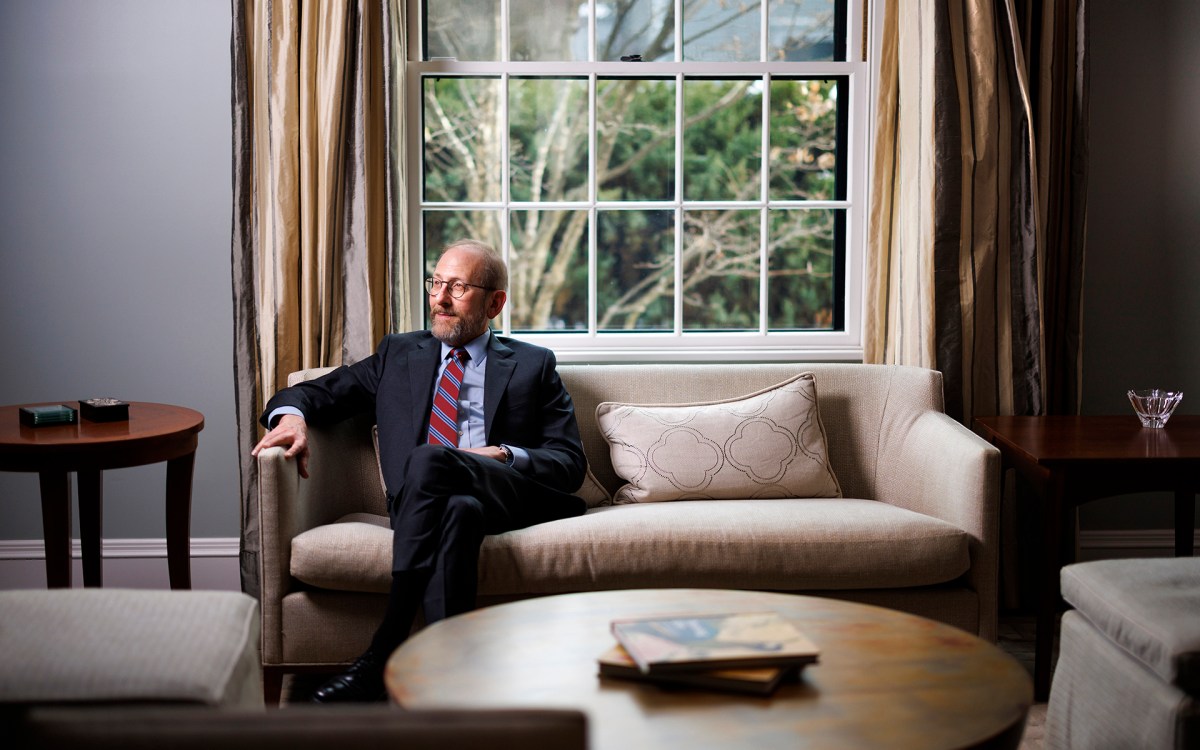Education key to upward mobility
D. Quinn Mills, the Albert J. Weatherhead Jr. Professor of Business Administration at the Harvard Business School, chaired the eight-member Ad Hoc Committee on Employment Policies that for the last year has been examining issues surrounding Harvards contingent workforce and its lowest-paid workers.
The Gazette recently discussed the Committees recommendations and the process that led up to them with Mills. The Gazettes questions and Mills replies follow:
Q. The Committee report recommends that the University take action in three major areas: greatly expanding training opportunities for entry-level workers; expanding the availability of health coverage for service workers; and adopting University-wide guidelines governing contracting. Why did the Committee focus on the educational program rather than the pay structure?
A. The committee felt it would be a very positive development if more people could advance out of low-paid jobs. Just about the only way we could help them do that is through education. Secondly, we are an educational institution and have a unique competence in this area. Finally, there is already some upward mobility which we can reinforce because people often come to Harvard in lower-paying jobs and move on to better jobs in the administration and in support services.
Q. Why didnt the Committee recommend that the University adopt a specific “living wage?”
A. We did consider that issue quite carefully, but decided that relying on a single figure, whether $10 per hour or any other, would be too narrow.
Very few Harvard employees currently earn less than $10 an hour when wages and benefits are combined. And even in areas where Harvard employees do earn less than $10 an hour, in the next round of bargaining (for new union contracts) it is likely those figures would exceed $10 an hour in combined wages and benefits.
We have a lot of sympathy with the objectives of the Living Wage Campaign. Where we differ is in the approach. That figure ($10 an hour) would only last a limited period of time and then it would have to be updated. In addition, it doesnt address health benefits. People would get $10 an hour but no health insurance. And third, the wage alone does not provide a potential vehicle to get them into better jobs.
Q. Was there concern that requiring contractors to provide additional health benefits would interfere with market forces influencing how contractors set compensation?
A. The major reflection of that (concern) lies in the dissent (by representatives of the Faculty of Arts and Sciences and the Medical School) attached to the main report. The dissent focused on the issue of health benefits for contracted employees. It raises the broader philosophical question of market forces. There are two major positions on this issue. One is that you, as an employer, accept what the market gives you for wages. The second is that you, as an employer, can and should change wages and benefits regardless of what the market says. Philosophically, we had people on the committee at both ends and in many places in between.
Q. With the dissent about the recommendation to require that contractors employees have health coverage coming from the committees representatives from the Faculty of Arts and Sciences and the Medical School, is there concern about how well the University will be able to implement the recommendations?
A. There are questions about how this can be implemented and whether it can be implemented. There are questions about interfering with market forces, about using money for this program that could be applied more directly to student programs, and about how difficult this will be to administer. But most people want to be sure that the people they work with have some kind of health benefits.
Another thing that could happen is we could no longer get people without health insurance working here because the employers who dont offer benefits wont work here anymore. That would certainly not be the effect we wanted. We did consider that quite carefully, but ultimately decided that was something we couldnt help.
Q. Was retention and the Universitys ability to attract low-skilled workers considered in deciding to go with the Committees final approach rather than the $10 per hour?
A. We talked a lot about retention. We talked a lot about the Universitys ability to hire. But it seems that the University isnt currently having a problem attracting or retaining employees.
Q. Was a stronger linkage considered that would move Bridge Program participants into some of the hundreds of openings Harvard has for higher-skilled jobs?
A. We discussed that, but felt there wasnt a need for it. Harvard has a lot of turnover. There are jobs open all the time and people already do move between jobs in the Harvard workforce.
Q. How much did student activism on the Living Wage issue affect the committees deliberations?
A. The activism in the sense of the demonstrations had no impact. I wasnt even aware of what was going on. As far as the content of our discussions in our meetings with students, and the information and argument in the students publications, we gave it a great deal of careful consideration.
Q. Did the potential that students might occupy a building as they have at other campuses influence the committee at all?
A. No, not in any way. If we had considered that, it might have angered members and made the committees work more difficult.
I would say, looking at the Committee as a whole, that it was broadly sympathetic to the students objective. We just arrived at a different solution.
Q. How important was cost in the Committees deliberations? Did the Committee discuss the fact that the direct cost of implementing a $10 per hour living wage would be cheaper than the Committees recommendations?
A. We never debated that (cost of living wage versus other recommendations). We tried to pay attention to the cost only to the extent that we didnt accidentally stumble into a bottomless pit (by proposing prohibitively expensive recommendations).
Q. How carefully did the Committee consider morality and the importance of the University doing the “right thing” from a moral standpoint?
A. We considered both carefully. I think most or all of my Committee would agree that as a general principle Harvard should not be trying to save money by contracting with firms which have unacceptable labor standards.
Q. Outsourcing has become a major part of this new economy. How carefully did the Committee consider this trend?
A. That was something we looked at a lot. We took a good hard look. We found that Harvard was positioned in its industry with other institutions. Its not doing much more than other institutions, but not too little either.
Most outsourcing is done for one of two reasons: For cost, and that is sometimes because the contracting company has lower wages and benefits; or because a firm is more specialized and more efficient.
The Living Wage Campaign directed our attention to dining services and custodial and service people. Harvard does a lot of activity in that area. We wanted to make sure we arent contracting in those areas just because of low labor cost due to low labor standards. That is why, in the end, we decided on the general guidelines.
Q. How did the committee process go? Were there things that surprised you?
A. It took a lot longer than I expected. It took more meetings, more time and effort. Everything was a lot more complicated.
Q. Are there future steps that you believe the University should take with regard to its workers, situations that were exposed that were perhaps outside the scope of the Committees work that should still be addressed?
A. I dont think so. We had a very broad charge and looked at many facets of the Universitys employment situation.




